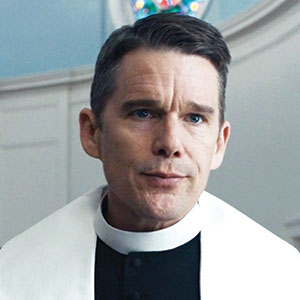Movies
Review: 'First Reformed'
 Ethan Hawke plays a hard-drinking priest battling inner demons in 'First Reformed.'
Ethan Hawke plays a hard-drinking priest battling inner demons in 'First Reformed.'The impassioned qualities Paul Schrader brings to First Reformed are exactly what one hopes for in a religion—it's compelling even when you don't believe it. No one gets a MacArthur Grant for figuring the film's roots: Ingmar Bergman's Winter Light (1962), Robert Bresson's Diary of a Country Priest (1951) and, to a lesser extent, Bresson's 1977's The Devil, Probably.
Bergman noted that one of his wives had described Winter Light as "a dreary masterpiece." Though this harmoniously composed First Reformed may not be a masterpiece, it's definitely not dreary. The anger in it—the American quality, that refuses to swallow wrath instead of expressing it as violence—gives it a simmer.
Ernst Toller (Ethan Hawke) is a solitary pastor, a devotee of Kierkegaard and Thomas Merton in a working class upstate New York wowed by charismatic churches. Toller leads the white-painted and steepled 250-year-old First Reformed church in Albany. It's a bone thrown at him by Jeffers, the well-fed pastor of the Abundant Life megachurch (Cedric Kyles aka Cedric the Entertainer). Plans are underway with an anniversary reconsecration, but the place is attended by few, except for bored tourists exiting through the gift shop.
Toller's pregnant parishioner Mary (Amanda Seyfried) approaches the pastor about her troubled husband Michael (Philip Ettinger), tormented about bringing a baby into a world doomed by climate change. Mary finds evidence that Michael plans a terrorist act. His likely target: a billionaire climate-change denier (Michael Gaston) modeled on one of the Koch brothers, who is a major donor to Abundant Life and First Reformed. Torn by his own uncertainty, and convinced by Michael's ecological activism, Toller wonders if he should make a martyr of himself.
Seyfried is the sun in this wintery movie, warming it up; her long blonde hair falls like a curtain in front of the camera in her close-up during a trust game with the pastor. Similarly, Cedric Kyles gives the movie a foot in the material world. Jeffers snaps impatiently at Toller, "You're always in the Garden (of Gethsemane)." Cedric does an impatient twirl in his leather chair, dealing with this prickly colleague who believes Christianity is all Good Friday and no Easter, who fails to realize that shepherding men requires a compromise here and there.
Hawke is very convincing as this wifeless, childless divine whose devotion to duty has almost destroyed him. Toller is a hard drinker in solitude—he mirrors Bresson's disliked country priest, eating himself alive not just with doubt, but with stomach cancer. If Toller is the type of Protestant scold who advertises his next sermon as "Will God Forgive Us?" he shows compassion when a class of visiting kids tour the holiest place in the church. It's the trap door concealed under a pew, a leftover from when First Reformed was a stop on the Underground Railroad. Toller's anxiety to make the kids understand is very touching.
The bleakness is nothing but honest in Alexander Tynan's photography, with its pristine Academy ratio, its visions of cold humble streets, bare lightbulbs and silent rooms. But another word for austere is "bald faced." Every now and again, one glimpses Hawke measuring the effect of his own acting. And sometimes Schrader seems to turn Toller into his most famous character: Travis Bickle in Taxi Driver. Toller is part of a career-long obsession with fanatics, and Schrader's continuing question of how deeply into the woods one can follow a madman.
It's an admirable comeback, an immersive portrait of obsession. Schrader was raised in his own tradition of devotion. He minored in theology at Calvin College, and for religious reasons never saw a movie until he was 17. He went from film critic to screenwriter to director. With his reverence and solitary note-taking, Toller resembles a movie fanatic. A variation of the theme in First Reformed could have been the contrast between an under-attended, old-time jewel box theater and a crass multiplex. Theaters turn to churches, both often turn into museums, and too often, as Milton wrote, the hungry sheep look up and are not fed.
First Reformed
R; 113 Mins.
Various Locations


